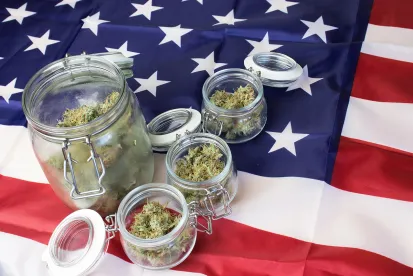If you give me an opportunity to quote George Harrison, I’m going to do it. In “Taxman,” he wrote:
Should five percent appear too small
Be thankful I don’t take it all
‘Cause I’m the taxman
Yeah, I’m the taxman
I suspect “The Quiet One” would be appalled to know the taxes facing cannabis operators – specifically Internal Revenue Code at 26 USC § 280E. That provision, discussed more fully below, often subjects cannabis operators to effective tax rates far north of 50%, more than virtually any other businesses in the United States. Cannabis companies would be happy to pay George’s 5%.
Federal Obstacles to the Cannabis Industry
There are, of course, a number of federal policy headwinds facing cannabis operators. Three immediately come to mind. The first, naturally, being that cannabis remains a Schedule I substance in the Controlled Substances Act. The second, which flows from the first, is that federal law discourages most financial institutions from banking cannabis businesses. The third is 280E. IRC 280E provides:
No deduction or credit shall be allowed for any amount paid or incurred during the taxable year in carrying on any trade or business if such trade or business (or the activities which comprise such trade or business) consists of trafficking in controlled substances (within the meaning of schedule I and II of the Controlled Substances Act) which is prohibited by Federal law or the law of any State in which such trade or business is conducted.
Possible Solutions to These Obstacles
So, let’s examine whether the federal government will lessen those headwinds. First, there is a chance that cannabis will be rescheduled or de-scheduled from the Controlled Substances Act. As we wrote late last year, President Biden has ordered Secretary of Health and Human Services Xavier Becerra “to initiate the administrative process to review expeditiously how marijuana is scheduled under federal law.” This was a huge symbolic step, but we have expressed skepticism that it would lead to concrete changes in the short term.
The second could be alleviated almost entirely with passage of the SAFE Banking Act. That legislation, which essentially would allow financial institutions to bank proceeds of state-legal cannabis operations, has passed the House of Representatives on six separate occasions but has not received a vote in the full Senate. Although the blog’s editors are not unanimous on this point, I think SAFE is likely on the shelf for a while if not outright dead. This view is shared by our colleagues at Harris Bricken, who recently opined that the SAFE Banking Act is “dead and gone (for now).” The rationale was that “Dems had two years of control to get the SAFE Banking Act passed and politics basically kept it from going through.”
The third is if Congress amends 280E to exempt state-legal cannabis operations. IRC 280E provides:
No deduction or credit shall be allowed for any amount paid or incurred during the taxable year in carrying on any trade or business if such trade or business (or the activities which comprise such trade or business) consists of trafficking in controlled substances (within the meaning of schedule I and II of the Controlled Substances Act) which is prohibited by Federal law or the law of any State in which such trade or business is conducted.
This provision is a killer for cannabis operators. Again from Harris Bricken:
Since cannabis is a Schedule I controlled substance, the IRS has used 280E to disallow cannabis businesses from deducting their ordinary and necessary business expenses. The result is that cannabis companies face much higher federal tax rates than similar companies in other industries. There are differing opinions on the level of tax rates imposed on marijuana companies – from 40% to 70% to as high as 90% – all of which are higher than the standard corporate tax rate paid by most other businesses in the United States.
. . .
The result of 280E is that normal business expenses such as rent, advertising, and employee salaries don’t reduce taxable cannabis income unless they can be allocated to Costs of Goods Sold (COGS). For cannabis growers, COGS typically includes expenses directly related to production of the plants, such as the seeds, electricity, and labor that went into growing and preparing the flowers for sale. For cannabis dispensaries and distributors, COGS is much more restrictive, and generally includes only the amount they paid for the cannabis products they sell plus a few additional allocations.
The 280E Fix
Congress can amend 280E to exempt state-legal cannabis operations. But this puts Congress in an interesting situation. On the one hand, Congress can keep in place a rule that prohibits credits and deductions for those who transact in all Schedule I products. On the other hand, Congress could make an exception for state-legal cannabis operations. While there is certainly some merit to inaction based on the fact that marijuana has not yet been rescheduled or de-scheduled, treating marijuana differently than other Schedule I drugs would be entirely consistent with long-standing federal policy. Specifically, the Treasury Department’s Financial Crimes Enforcement Network has provided guidance allowing for financial institutions to bank cannabis customers, Congress has defunded Department of Justice efforts to prosecute state-legal cannabis businesses, and the Department of Justice has previously issued a (since rescinded) memorandum discouraging federal prosecutors from prosecuting state-legal cannabis operators. If Congress and the executive branch are willing to make these exceptions for marijuana companies, it does not seem a stretch for the IRS to make exceptions for state-legal cannabis companies.
For years, the focus of cannabis reform advocates in Congress has been the SAFE Banking Act. That still may become law, and it would certainly benefit the industry. But after at least six failed attempts to pass SAFE, maybe tweaking an obscure provision of the Internal Revenue Code is the best chance to give cannabis companies a fighting chance to succeed.




 />i
/>i

